These are the worst culture shocks for foreigners coming to Sweden
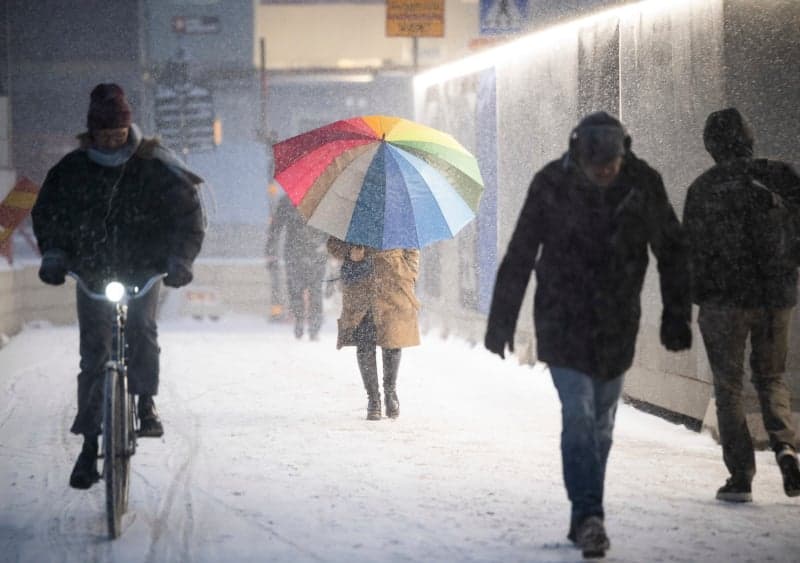
From the digitised society, to the food and the weather, to small talk and public nakedness, the culture shocks readers reported on arrival in Sweden depended a lot on where they, themselves, came from.
The darkness and the cold
It's perhaps not strictly a culture shock, but several respondents said they had been unprepared for how arduous Sweden's long winters were and how much the darkness affected the locals.
"The long winter is made more depressing by the private nature of Swedes," said one American. "This is a stark contrast to summer and even spring where Swedes become different people - outgoing and fun. This whiplash is strange for me as an American."
"The dark and prolonged winters make Swedes depressed and withdrawn, and I am also starting to feel the same," said a respondent from Southeast Asia.
"The winter is long and despite coming from another northern European country (UK) the difference is significant," said a British respondent. "I write this in mid April and the trees and bushes are still bare. There is also still the possibility of another snowfall before we reach the first week of May."
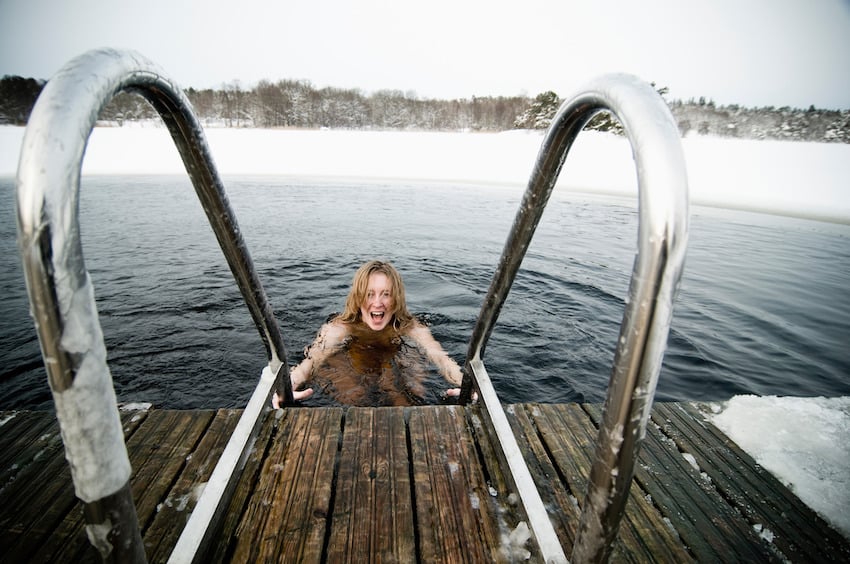
A woman leaps into the lake by the sauna in Hellasgården in Stockholm. Photo: Helena Wahlman/Imagebank Sweden
Nudity
Many people from cultures where nudity is unusual in front of strangers even from the same sex said they had been taken aback by the relaxed attitudes shown in public changing rooms.
"What came as a complete shock was seeing people get completely naked in the changing areas of gyms and swimming pools," one respondent from India said. "That took some getting used to, especially the level to which nudity is normalised and accepted in the Swedish society."
"Nudity in a same-gender area in public places like a bath house or changing room is normal here," said Sylvi from Indonesia.
READ ALSO: How, where and when can you get naked in Sweden?
Food
Perhaps predictably, the Italians and the French were the two nationalities most shocked by Swedish food culture.
"The fact that 'sauce' is a food group", was a horrifying discovery for the Italian respondent, while a French respondent said she had initially struggled with fish-based products such as inlagd sill (pickled herring) and Kalles Kaviar (fish egg spread).
"What was the biggest shock for me was tasting the herring preserves and spreads and discovering they are slightly sweet fish," she said. "The first time was too much of a shock to appreciate the food but now that I know it is fine."
"I was also surprised by how much candy people eat here. I had assumed people in Sweden were really healthy," said an American respondent. "That brings me to my second biggest culture shock – how Swedish people eat in general. I live in the countryside and it’s mostly meat and potatoes around here. People do not eat much vegetables. That is very surprising to me."
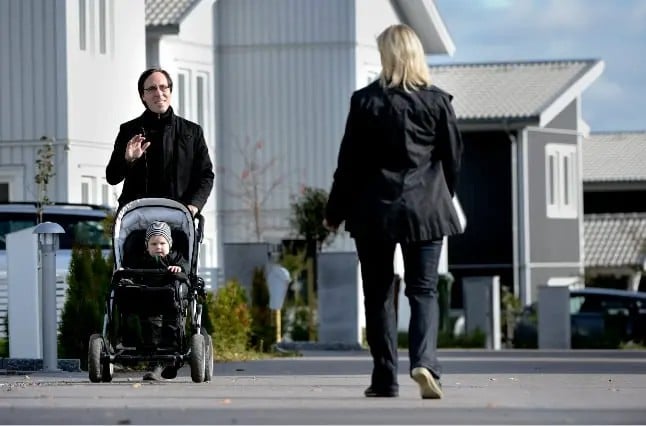
Neighbours greet each other in a Stockholm suburb: Photo: Imagebank Sweden
Social life
One thing that people from almost every country could largely agree on was their initial shock at the way social life works (or you might say doesn't work) in Sweden.
The near absence of small talk in Sweden seemed to hit Americans hardest of all.
"It was surprising how little interaction between strangers there is," said one respondent. "In the States some of what turned out to be lasting friendships started out as random meetings at a park, or on the train, or at a coffee shop."
Another American said she had been surprised by "how unfriendly some people are at first".
"I found some people take a long time to warm up. Sometimes I try to just say a friendly hello to an acquaintance and they avoid eye contact, so I can’t. I’m American and people in the US are way more friendly in general."
It wasn't only Americans who struggled with the reluctance of Swedes to engage with strangers.
"It seems so difficult to 'meet' Swedes," complained one respondent from Belgium. "They are polite, of course, but it's hard to make friends. It feels like everything comes into categories like, at work is to work, in the tube is for transport, on Tinder it's to flirt. Also, everything has to be planned, so there's not much space to be spontaneous. 'Let's have a beer after work! Oh no, I can't this week'."
A German respondent said it had been a shock that "nobody says hello in the staircase", while someone from Africa marvelled at the fact that he didn't know his neighbours.
"The aversion to small talk and the shyness which makes it difficult to make friends can, to a gregarious Brit, make everyday life pretty miserable," agreed a respondent from the UK. "I was aware of the stereotypes before I arrived seven years ago, and thought they were exaggerated, but I am sad to say that the stereotypes have largely prevailed."
He did manage to find an upside, however.
"It does mean that when a smile is returned on the street or in a shop or you do meet a chatty, friendly local then it feels disproportionately wonderful!"
Swedes' reluctance to make eye contact came up a lot, with one respondent from Southeast Asia citing it as a particular issue. "Some Swedes don't look at you in the eye, or even acknowledge your existence!".
READ ALSO: How to get on with your neighbours in Sweden
Lack of street life
For some other nationalities, the shock came less from the lack of small talk with strangers, and more from the lack of the bustle they are used to on the streets.
"It is so quiet here that in the beginning I used to wonder whether anyone lives in my surroundings," said one respondent from India. "Not seeing anyone in the street where i live and not hearing a single voice is a big difference from my home country."
People also struggled with the low level of socialising with work colleagues.
"My colleagues only speak to me at social events after a couple of drinks, and back at the office, it's like we're back to being strangers again," said the respondent from Southeast Asia. "They're the most socially awkward people I have EVER met in my life. They come across as cold, unfeeling, spiritually bereft."
Public rudeness
A lot of foreigners interpreted Swedes' wish not to interfere in the lives of strangers as active rudeness.
A respondent from New Zealand said he had been surprised at "how impolite people are in public places".
Swedes, he said were "some of the most kind people you will ever meet if you are face to face talking to them, but some of the rudest and most inconsiderate people in the world in other places".
"People spit and empty their nostrils on the street," complained a Brit. "There's a total lack of spatial awareness. People just barge in front of you, practically walk into you, never move out of your way, when you move out of their way then it is rarely acknowledged."
One American respondent complained that "people don’t step aside when you meet them, whether in the grocery store or on the sidewalk".
A person from Africa, on the other hand, said she had an issue with "the five metres distance between people".
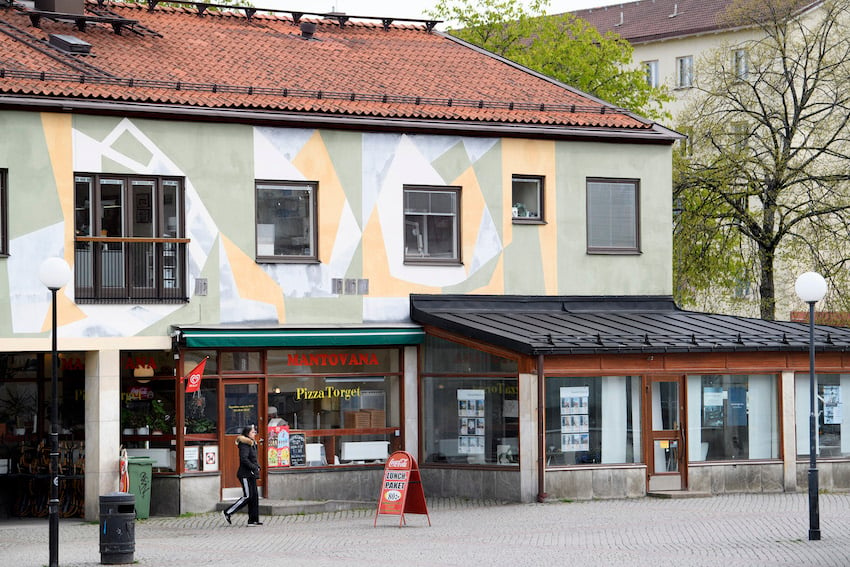
A typical Swedish pizzeria. Photo: Jessica Gow/TT
Lack of amenities, country pubs, services
Nick, a British man living near Hässleholm in Skåne said he missed the country pubs he enjoyed back home in the UK.
"The lack of cosy eateries and pubs in small towns and villages. Most places have similarly soulless pizzerias and Chinese or Thai restaurants that don’t exactly draw you in."
"Restaurants close in winter, I can't get around that. I come from Johannesburg and the social life is booming," agreed a South African respondent.
It wasn't just pubs, many respondents missed the late night opening of shops back home.
"Why do shops close so early?" asked one respondent from Chennai, India. "Why do the shops have even less shorter hours during weekends?"
One recent arrival from India complained that there were "no quick bite food stalls or snack shops".
One respondent from Dubai complained that there are "no services" in Sweden, which, he said "makes a lot of things time consuming".
"Another thing is the cleanliness. Everything is dirty: public toilets, restaurants, and you can see garbage thrown in a lot of places."
Conflict avoidance
The Swedish culture of conflict avoidance and consensus seemed to particularly grate with people from more combative Eastern European cultures, with a respondent from Macedonia bemoaning "the culture of avoiding conflict and being indirect in discussions".
A Ukrainian respondent agreed.
"If you are really curious about someone, you need to talk to them one-on-one, because only then you will get a chance to find out that they are frustrated about their government, medical care system, ferryboat prices, taxes and so on," she said. "Don't expect them to say it in a group that includes other Swedes."
She said this reluctance to clash with others followed over into personal relationships.
"Swedes are so afraid of conflicts, so instead of being direct, they contain this unhappiness about you and let it boil away inside, and then finally someday you will see them explode about something really small."
"As someone that has travelled around the globe I really found the conformity of Swedes and their reluctance express opinion unique," said another respondent. "For a country that boasts of its openness and inclusion I find it quite an oxymoron that everyone is asked not to 'stick out'".
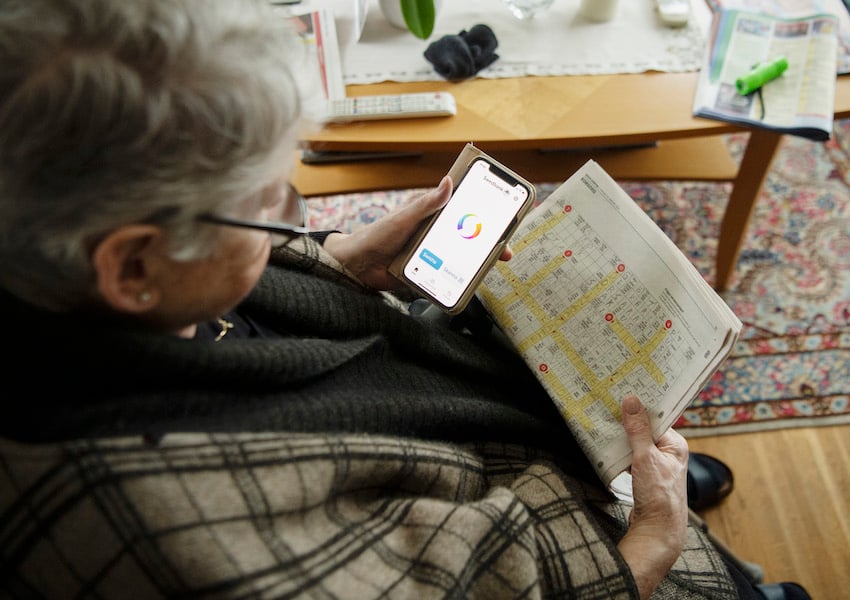
An elderly woman looks at the Swish payment app while doing a crossword. Photo: Caisa Rasmussen/TT
Digitised, cash-free society
The extent to which services in Sweden are digitised amazed some respondents.
"I've been here for a month and have yet to see any cash used," marvelled a person from Hawaii, while a British respondent said he had been blown away by "how digitised it is".
"If you don’t have BankID," he said, "you barely exist."
For one Ukrainian respondent who presumably cannot get a BankID, this is a reality.
"You can't function normally in Sweden without a personal number. It is depressing," they said.
An American respondent said they had been shocked by "the amount a cell phone is required here".
"Bank ID, Swish, sports clubs, so much is done by apps," she said. "As someone who previously tried to get away from my phone, I find I am now tied more than ever."
Meanness
Swedish individualism means that the traditions of generosity and hospitality common in many other countries in the world do not really hold, something many foreigners said they had struggled to come to terms with.
"The biggest cultural shock for me is getting a birthday invitation from a Swede where you are expected to bring the booze, as well as a gift," said a respondent from Macedonia.
"I was asked how many potatoes I wanted to eat, 3 or 4?, over the phone two days before dinner at a friend's place," reports a video game developer from Southeast Asia.
"Also, over Easter, my friend and I had to wait for our hosts to finish eating their steak dinner before we were asked to join them at the table for drinks, and we drank our beer, whilst they drank their wine."
Have you have any culture shocks on coming to Sweden? We'd love to hear from you. Get in touch at [email protected]
Comments (3)
See Also
The darkness and the cold
It's perhaps not strictly a culture shock, but several respondents said they had been unprepared for how arduous Sweden's long winters were and how much the darkness affected the locals.
"The long winter is made more depressing by the private nature of Swedes," said one American. "This is a stark contrast to summer and even spring where Swedes become different people - outgoing and fun. This whiplash is strange for me as an American."
"The dark and prolonged winters make Swedes depressed and withdrawn, and I am also starting to feel the same," said a respondent from Southeast Asia.
"The winter is long and despite coming from another northern European country (UK) the difference is significant," said a British respondent. "I write this in mid April and the trees and bushes are still bare. There is also still the possibility of another snowfall before we reach the first week of May."

Nudity
Many people from cultures where nudity is unusual in front of strangers even from the same sex said they had been taken aback by the relaxed attitudes shown in public changing rooms.
"What came as a complete shock was seeing people get completely naked in the changing areas of gyms and swimming pools," one respondent from India said. "That took some getting used to, especially the level to which nudity is normalised and accepted in the Swedish society."
"Nudity in a same-gender area in public places like a bath house or changing room is normal here," said Sylvi from Indonesia.
READ ALSO: How, where and when can you get naked in Sweden?
Food
Perhaps predictably, the Italians and the French were the two nationalities most shocked by Swedish food culture.
"The fact that 'sauce' is a food group", was a horrifying discovery for the Italian respondent, while a French respondent said she had initially struggled with fish-based products such as inlagd sill (pickled herring) and Kalles Kaviar (fish egg spread).
"What was the biggest shock for me was tasting the herring preserves and spreads and discovering they are slightly sweet fish," she said. "The first time was too much of a shock to appreciate the food but now that I know it is fine."
"I was also surprised by how much candy people eat here. I had assumed people in Sweden were really healthy," said an American respondent. "That brings me to my second biggest culture shock – how Swedish people eat in general. I live in the countryside and it’s mostly meat and potatoes around here. People do not eat much vegetables. That is very surprising to me."

Social life
One thing that people from almost every country could largely agree on was their initial shock at the way social life works (or you might say doesn't work) in Sweden.
The near absence of small talk in Sweden seemed to hit Americans hardest of all.
"It was surprising how little interaction between strangers there is," said one respondent. "In the States some of what turned out to be lasting friendships started out as random meetings at a park, or on the train, or at a coffee shop."
Another American said she had been surprised by "how unfriendly some people are at first".
"I found some people take a long time to warm up. Sometimes I try to just say a friendly hello to an acquaintance and they avoid eye contact, so I can’t. I’m American and people in the US are way more friendly in general."
It wasn't only Americans who struggled with the reluctance of Swedes to engage with strangers.
"The aversion to small talk and the shyness which makes it difficult to make friends can, to a gregarious Brit, make everyday life pretty miserable," agreed a respondent from the UK. "I was aware of the stereotypes before I arrived seven years ago, and thought they were exaggerated, but I am sad to say that the stereotypes have largely prevailed."
He did manage to find an upside, however.
Swedes' reluctance to make eye contact came up a lot, with one respondent from Southeast Asia citing it as a particular issue. "Some Swedes don't look at you in the eye, or even acknowledge your existence!".
READ ALSO: How to get on with your neighbours in Sweden
Lack of street life
For some other nationalities, the shock came less from the lack of small talk with strangers, and more from the lack of the bustle they are used to on the streets.
"It is so quiet here that in the beginning I used to wonder whether anyone lives in my surroundings," said one respondent from India. "Not seeing anyone in the street where i live and not hearing a single voice is a big difference from my home country."
People also struggled with the low level of socialising with work colleagues.
"My colleagues only speak to me at social events after a couple of drinks, and back at the office, it's like we're back to being strangers again," said the respondent from Southeast Asia. "They're the most socially awkward people I have EVER met in my life. They come across as cold, unfeeling, spiritually bereft."
Public rudeness
A lot of foreigners interpreted Swedes' wish not to interfere in the lives of strangers as active rudeness.
A respondent from New Zealand said he had been surprised at "how impolite people are in public places".
Swedes, he said were "some of the most kind people you will ever meet if you are face to face talking to them, but some of the rudest and most inconsiderate people in the world in other places".
"People spit and empty their nostrils on the street," complained a Brit. "There's a total lack of spatial awareness. People just barge in front of you, practically walk into you, never move out of your way, when you move out of their way then it is rarely acknowledged."
One American respondent complained that "people don’t step aside when you meet them, whether in the grocery store or on the sidewalk".
A person from Africa, on the other hand, said she had an issue with "the five metres distance between people".

A typical Swedish pizzeria. Photo: Jessica Gow/TT
Lack of amenities, country pubs, services
Nick, a British man living near Hässleholm in Skåne said he missed the country pubs he enjoyed back home in the UK.
"The lack of cosy eateries and pubs in small towns and villages. Most places have similarly soulless pizzerias and Chinese or Thai restaurants that don’t exactly draw you in."
"Restaurants close in winter, I can't get around that. I come from Johannesburg and the social life is booming," agreed a South African respondent.
It wasn't just pubs, many respondents missed the late night opening of shops back home.
"Why do shops close so early?" asked one respondent from Chennai, India. "Why do the shops have even less shorter hours during weekends?"
One respondent from Dubai complained that there are "no services" in Sweden, which, he said "makes a lot of things time consuming".
"Another thing is the cleanliness. Everything is dirty: public toilets, restaurants, and you can see garbage thrown in a lot of places."
Conflict avoidance
The Swedish culture of conflict avoidance and consensus seemed to particularly grate with people from more combative Eastern European cultures, with a respondent from Macedonia bemoaning "the culture of avoiding conflict and being indirect in discussions".
A Ukrainian respondent agreed.
"If you are really curious about someone, you need to talk to them one-on-one, because only then you will get a chance to find out that they are frustrated about their government, medical care system, ferryboat prices, taxes and so on," she said. "Don't expect them to say it in a group that includes other Swedes."
She said this reluctance to clash with others followed over into personal relationships.
"Swedes are so afraid of conflicts, so instead of being direct, they contain this unhappiness about you and let it boil away inside, and then finally someday you will see them explode about something really small."
"As someone that has travelled around the globe I really found the conformity of Swedes and their reluctance express opinion unique," said another respondent. "For a country that boasts of its openness and inclusion I find it quite an oxymoron that everyone is asked not to 'stick out'".

Digitised, cash-free society
The extent to which services in Sweden are digitised amazed some respondents.
"I've been here for a month and have yet to see any cash used," marvelled a person from Hawaii, while a British respondent said he had been blown away by "how digitised it is".
"If you don’t have BankID," he said, "you barely exist."
For one Ukrainian respondent who presumably cannot get a BankID, this is a reality.
"You can't function normally in Sweden without a personal number. It is depressing," they said.
An American respondent said they had been shocked by "the amount a cell phone is required here".
"Bank ID, Swish, sports clubs, so much is done by apps," she said. "As someone who previously tried to get away from my phone, I find I am now tied more than ever."
Meanness
Swedish individualism means that the traditions of generosity and hospitality common in many other countries in the world do not really hold, something many foreigners said they had struggled to come to terms with.
"The biggest cultural shock for me is getting a birthday invitation from a Swede where you are expected to bring the booze, as well as a gift," said a respondent from Macedonia.
"I was asked how many potatoes I wanted to eat, 3 or 4?, over the phone two days before dinner at a friend's place," reports a video game developer from Southeast Asia.
"Also, over Easter, my friend and I had to wait for our hosts to finish eating their steak dinner before we were asked to join them at the table for drinks, and we drank our beer, whilst they drank their wine."
Have you have any culture shocks on coming to Sweden? We'd love to hear from you. Get in touch at [email protected]
Join the conversation in our comments section below. Share your own views and experience and if you have a question or suggestion for our journalists then email us at [email protected].
Please keep comments civil, constructive and on topic – and make sure to read our terms of use before getting involved.
Please log in here to leave a comment.